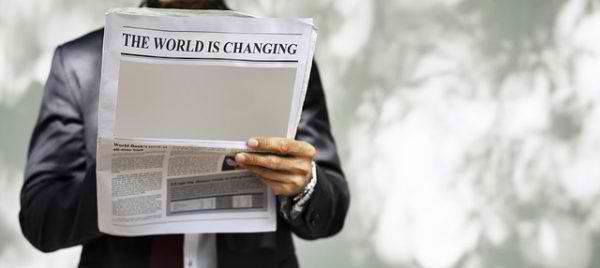[bctt tweet="Nothing lasts forever. What is a stronghold today may lie in shambles tomorrow, and the successful are those who anticipate change." username="QaziniKenya"]
In an interview with the young entrepreneur Isaac Muigai last week, I asked him, “What lessons have you learned from COVID-19?” Long after the interview was published here on Qazini, that same question seemed to ricochet and bounce back to me. What lessons am I picking from this unprecedented pandemic that has taken so many lives and brought the world economy to its knees?
Change is inevitable. That is my lesson. Just like the wind gathers fallen leaves, this lesson gathers my thoughts around a little book I once read, by author Spencer Johnson.
When I first picked the book ‘Who Moved My Cheese’ I never quite knew the impact it would have on my life. My elder brother has a natural attraction towards business, a reason he picked this little book by Spencer off the shelves of a bookstore. He devoured the book within a day. Amused by the rhetorical title, I borrowed it.
Who Moved My Cheese? There is a magical way in which the brain works. Simple words, phrases, or titles ignite imagination and make you start thinking of a faraway land with faraway events. Why cheese? Who moved it and why? What happened after the cheese was moved? These questions plagued me into the night until one morning I decided to start reading the book. So simple, so compact, a finish-in-one-sitting book; but it has sold over a million copies.
It’s a motivational business fable, riveting, though it has fallen under criticism for being too simple. Critics have poured scoff at it for being childish, simplistic and silly. Yet for every criticism hurled, a multitude of fans arise with testimonials of how they found greatness in the simplicity of the book. In this case, both the critics and fans are right.
Who Moved My Cheese is unbelievably soft- like a story plucked from a children’s book, but if you cut through the simplicity, you will uncover a minefield of powerful lessons on the inevitability of change. In my opinion, the bandying of words between fans and critics of Spencer Johnson’s little story presents to us the case of the two men standing in the night; one sees the darkness, whereas the other sees the stars.
In this little fable, the best-selling author of ‘One Minute Manager’ narrates the story of two little people and two mice. Hem and Haw, the little people; and Sniff and Scurry― who are mice. They all live in a maze that holds secret entries to rooms with different types of cheese. Cheese is their staple, and so to survive they must work to find a fresh supply of cheese in the maze.
The story starts with both the mice and little people enjoying a great supply of cheese. To prove the axiom ‘nothing lasts forever’ true, one morning the mice and little people wake up to a heart-stabbing realization that the supply of their cheese is no more.
Sniff and Scurry do what mice do best: they sniff and scurry. They put on their running shoes immediately and run out into the maze in search of a new supply of cheese. In an absolute behaviour contrast, the little people Hem and Haw sit at the spot where their cheese was, and mourn their loss; they are devastated and supremely angry at whoever moved their cheese. If they found the idiot responsible for this, they would skin him like a ripe grape. They also hold on to a fruitless hope that the person who moved their cheese will ultimately re-think their decision and return their food. After all, they are entitled to it.
On the other hand, Sniff and Scurry understand that in life, change has divested us of entitlement to any status. Nothing lasts forever. What is a stronghold today may lie in shambles tomorrow, and the successful are those who anticipate change. Anticipating change even when you are at the heights of success is a wise card to have up your sleeve. When the chips are down an unseen hand knocks you off your normal path, your ability to make quick decisions and readjust will be your armour.
It is their ability to get slammed down hard by change and still put on their running shoes and step into the maze that enables the mice to soon find a new room with an unlimited supply of fresh cheese.
Hem and Haw, the unwise little people, sit and wallow. They thin out as time passes and the situation poses a big threat to their existence. In a long and cold night forced upon them by uncertainty, will they choose to focus on the darkness or the stars? Read Who Moved My Cheese to find out. Meanwhile, here are some key lessons I picked up from the book:
Change is Inevitable
Regardless of how formidable your business or career might seem, change will come knocking at your door. It is a respecter of no man. It is only wise to anticipate and act quickly when change happens. Whether positive or negative change, you must be ready to adjust accordingly. Who Moved My Cheese shines light to this truth and has been enacted in this Youtube video
After change happens, your reaction matters
Our reaction to change either sets us apart or condemns us to the gallows. The same disaster may strike two different people, but then how they each respond determines who survives the storm and who capsizes. How do you react to change?
1. Anticipate change: Constantly take stock of where you stand. It could be individually, or as a business, a leader, a creative; whichever your field. Don’t only take stock when the storm is with you, but make it a routine to cast your sights into the future, anticipate what lies ahead, and prepare.
2. Learn to accept: When change happens negatively and brings you to your knees, learn to accept. It is natural to cry out and moan, but do not overdo it. Learn to accept, because only then can you adjust.
3. Learn to adjust: After accepting, the next move is to adjust to the new norm. What are the new trends? What has changed and what do you need to get back up or stay afloat? Understanding the new trends will help you know what fresh skills you need. An example is the new norm to work from home after COVID-19 struck. With it came increased use of online collaboration and communication platforms like Zoom, Google Meet; and remote working. People who weren’t tech-savvy had to learn skills to use these new tools. The earlier you adjust, the easier it becomes for you to advance.
4. Learn to advance: After accepting change and adjusting to the new trends, it is now time to advance. And not just advancing blindly, but doing it while anticipating change to strike yet again.
Will you tighten your helmet or will you fall in battle? When inevitable change strikes, will you be able to accept, adjust, and then advance? The choice is yours to make.





